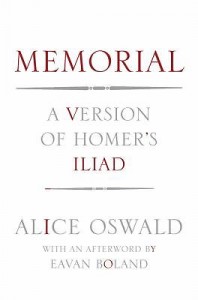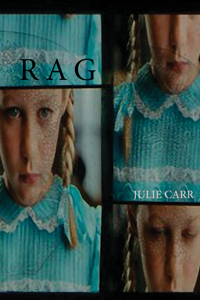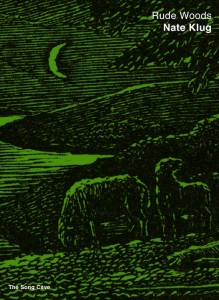A Recommendation from our Poetry Reviews Editor,
Dan Beachy-Quick
Most of us read more than one book at a time. It’s a habit that at its worst leaves each book with less than full attention, an error that leaves—at least for me—worthy pages unread. Other times, reading more than one book at once reveals an interconnectedness so powerful it makes of reading each simultaneously a singular experience that can be had in no other way. I’ve recently had the good fortune of just such an experience, and so wanted to recommend three books that, as brilliant as each one is individually, cast such a mutual light one onto the other that reading them together provides an illuminating set of hours.
 Alice Oswald’s Memorial: A Version of Homer’s Iliad abandons far more of the epic than it translates, a move that, for however much it might chagrin the “purist,” gives to the contemporary reader a sense of the poem that places Homer fully in the context of our own being currently at war. Translating only the scenes of death along with the names of those who died, and the epic similes (almost always repeated twice), we gain not only a haunted, haunting book-length elegy that speaks specifically to the life within the names lost in battle, but to the complicit realization that the names we send now to war also suffer wounds and die and have no singer to repair the loss back into value. Narrowing the Iliad down to these most basic elements also reveals the strange nature of the epic simile, that which tries to explain by death by doing a death-like work: naming the un-nameable thing by likening unlikeness. Death, one feels in this book, is not an event of life, but the end of it. Words want to follow, but they don’t know how. Sometimes all that’s left is a name: “And PROTHOENOR died.”
Alice Oswald’s Memorial: A Version of Homer’s Iliad abandons far more of the epic than it translates, a move that, for however much it might chagrin the “purist,” gives to the contemporary reader a sense of the poem that places Homer fully in the context of our own being currently at war. Translating only the scenes of death along with the names of those who died, and the epic similes (almost always repeated twice), we gain not only a haunted, haunting book-length elegy that speaks specifically to the life within the names lost in battle, but to the complicit realization that the names we send now to war also suffer wounds and die and have no singer to repair the loss back into value. Narrowing the Iliad down to these most basic elements also reveals the strange nature of the epic simile, that which tries to explain by death by doing a death-like work: naming the un-nameable thing by likening unlikeness. Death, one feels in this book, is not an event of life, but the end of it. Words want to follow, but they don’t know how. Sometimes all that’s left is a name: “And PROTHOENOR died.”
The partial translations of Virgil’s Eclogues found in Nate Klug’s Rude Woods take place far from the battlefield dust of Troy. Here we have the shepherds singing and competing in song. Love’s difficulty finds its rhythm while the sheep graze. Bound and drunk Silenus sings out “causes and first things,” reminding us that none are removed from the facts that undergird the mystery of the world they also guard. But for all the brightness of the pastoral vision, for all the turning away from work so as to pick up the lyre and tune thought to a better pitch, and for all the abandonment of epic and its spilling blood, it is a light that pushes back against the old human darkness of war and death in such a way that the dark edge cannot not be felt.
It gives, then takes everything back, Time,
even, especially, the mind.
I can remember singing: a boy once,
But me, Moeris, setting the long summer suns
To rest with songs. Now they’re gone to me.
Voice itself escaped my voice.
Wolves watch me.
 Leaping over centuries, but carrying them with her in her voice, Julie Carr’s brand new RAG speaks to us in lyric shard and sentences glanced by what they see—that is, “glanced” in the old sense, as in, what you see wounds you. Shattering the boundary that might keep the personal from the political, Carr’s voice here comes to me as if a member of the Euripidean Chorus walked through time to sing now here, in 21st century America, while raising a family, while attending to the whole of it, life—byways of beauty and backwater of lust, violence in the air like broken epic, all of it rendered so feelingly that we feel too the cut. RAG continues a body of work by Carr that strikes me as more and more central to living in this day and age, in this country—not exactly a work of witness, for it understands its complicity. I might call it a map of the tangle: no life separate, in the end, from the fact of other lives; and yet, as it must be, connected to those lives in ways so vestigial we must work to feel the harm another suffers. Carr’s pages give us nerve. Not bravery, exactly. I mean nerves. She makes as nervous, as we should be. She gives us back our nerves.
Leaping over centuries, but carrying them with her in her voice, Julie Carr’s brand new RAG speaks to us in lyric shard and sentences glanced by what they see—that is, “glanced” in the old sense, as in, what you see wounds you. Shattering the boundary that might keep the personal from the political, Carr’s voice here comes to me as if a member of the Euripidean Chorus walked through time to sing now here, in 21st century America, while raising a family, while attending to the whole of it, life—byways of beauty and backwater of lust, violence in the air like broken epic, all of it rendered so feelingly that we feel too the cut. RAG continues a body of work by Carr that strikes me as more and more central to living in this day and age, in this country—not exactly a work of witness, for it understands its complicity. I might call it a map of the tangle: no life separate, in the end, from the fact of other lives; and yet, as it must be, connected to those lives in ways so vestigial we must work to feel the harm another suffers. Carr’s pages give us nerve. Not bravery, exactly. I mean nerves. She makes as nervous, as we should be. She gives us back our nerves.
Dan Beachy-Quick is the author of five books of poetry, most recently Circle’s Apprentice; a book of interlinked essays on Moby-Dick, A Whaler’s Dictionary; a collection of essays, meditations, and tales, Wonderful Investigations; and a novel, An Impenetrable Screen of Purest Sky. In 2013, University of Iowa Press published his monograph on John Keats, A Brighter Word than Bright: Keats at Work. He teaches in the MFA Writing Program at Colorado State University and is the poetry book review editor for Colorado Review.
